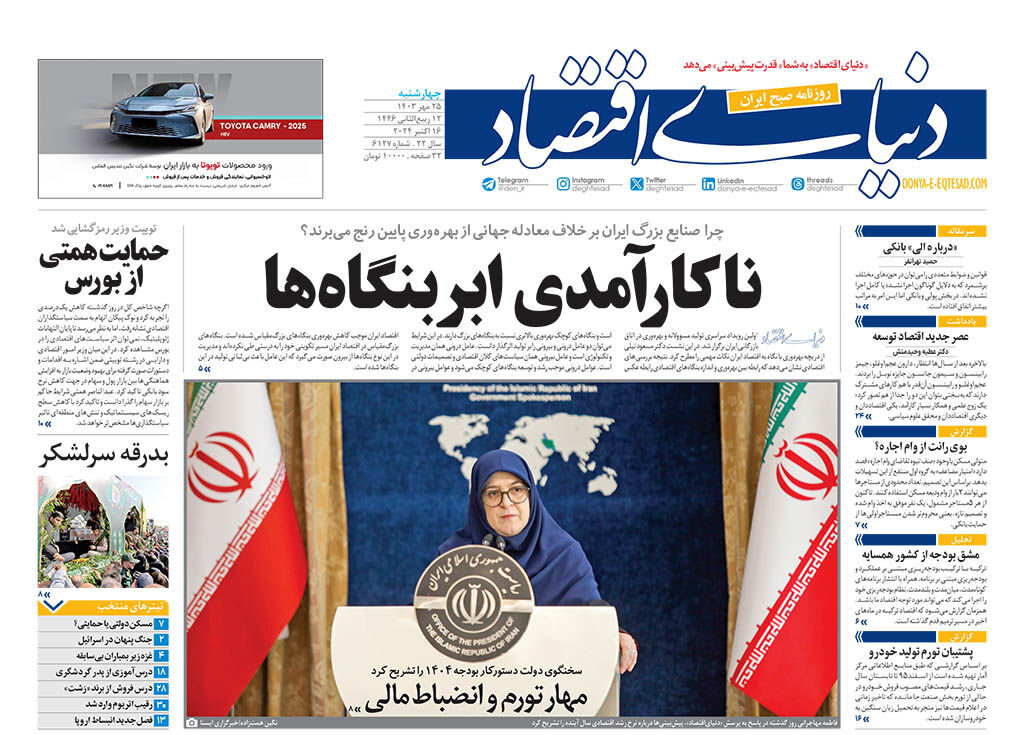The illusion of a ‘new Middle East’

TEHRAN - In a note, Donya-e-Eqtesad discussed transformation in the Middle East after the 7th of October and wrote: After the October 7th attack the situation in the Middle East changed.
It led to a direct war between Israel, Iran, and its allies. Israel's possible attacks on Iran's nuclear facilities and vital economic infrastructure, and Iran's retaliation against Israel's vital facilities and cities, are among the red lines that bring the war into a new and even more dangerous phase. It is now unlikely that Israel will stop its attacks on Lebanon and Syria. Hezbollah and Iran will not fight back, because we know that Netanyahu's strategy is to destroy Hezbollah to undermine Iran's regional clout. Israel and the U.S. are dreaming of creating a "new Middle East" that would minimize Iran's influence and establish a durable alliance with Arab countries. With these conditions, glimmers of hope such as the global coalition led by Saudi Arabia to create a Palestinian state and propose a common peace need immediate global and regional support.
Arman-e-Emrooz: Ambiguities in possible confrontation between Iran and Israel
In an article, Arman-e-Emrooz discussed the technique, time and level of Israel's response to Iran's October 1 legitimate attack. It wrote: Israeli media claimed that the government has reached a complete agreement on the technique, time and level of response to Iran's attack. About the time of Israel's response, some American media have said that this will happen before the American presidential election on November 5th. About three weeks are left until the election. But regarding the level of Israel's response to Iran's missile attack, it is unlikely that Iran's nuclear and oil facilities will be "directly attacked" at this step, and Israel's focus will be on targeting military sites, especially offensive and defensive units. But what will happen after the possible Israeli attack depends on two factors: first, its level and intensity; and second is Iran's reaction. If Israel shows a limited reaction, nothing special will happen. But if it is widespread and severe, we should wait for Iran's decision.
Iran: Europe's strategic mistake regarding sanctions against Iran
In an interview with Abed Akbari, an expert on political issues, the Iran newspaper examined the new Western sanctions on the Islamic Republic. Akbari said: The European Union announced new sanctions against Iran.
The duty of European leaders is only impartial mediation, which is the only demand of the people of the region and Iran. The U.S. support for Israel's crimes, which are causing a deep wound in the region, will also harm Europe. Today, Europe's task is to try to prevent the spread of instability in West Asia and, as a result, its neighboring regions. Although Europe owes its security to Iran due to the Islamic Republic’s efforts in cracking down on terrorist groups in West Asia, today, as a debtor, it seeks to increase international sanctions and pressure on Iran.
Siasat-e-Rooz: IMEC Corridor and Israeli warmongering in the region
Siasat-e-Rooz dedicated its editorial to the planned IMEC Corridor and the purpose of its launch. It said: One of the goals of this plan is to normalize relations between the Arabs and the Zionist regime. Another goal is to intensify economic sanctions against Iran. It aims to undermine Iran's economic relations. The construction of the IMEC Corridor would weaken Iran's economic and geographical status in the region to the extent that it would affect Iran's exports and imports. The International North–South Transport Corridor (INSTC), initiated by Iran, has not been completed after many years. It should be put into operation more quickly to counter IMEC. The IMEC Corridor conflicts with the interests of several countries in the region, so Iran can have bilateral and multilateral agreements with countries that are not part of the IMEC project. In fact, the fake Israeli regime plans to destroy Hamas in Gaza and Hezbollah in Lebanon to control that area to ensure the security of the implementation of the IMEC plan.
(INSTC is a 7,200-km (4500 mile) long multi-mode network of ship, rail, and road routes for moving freight between India, Iran, Azerbaijan, Russia, Central Asia and Europe. The route primarily involves moving freight from India, Iran, Azerbaijan and the Russian Federation via ship, rail and road. The objective of the corridor is to increase trade connectivity between major cities such as Mumbai, Moscow, Tehran, Baku, Bandar Abbas, Astrakhan, Bandar Anzali, etc.)
Leave a Comment